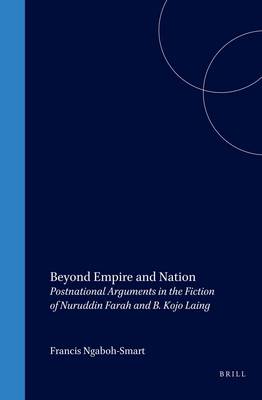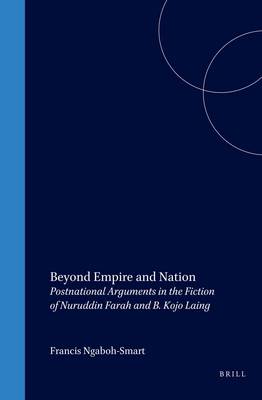
- Afhalen na 1 uur in een winkel met voorraad
- Gratis thuislevering in België vanaf € 30
- Ruim aanbod met 7 miljoen producten
- Afhalen na 1 uur in een winkel met voorraad
- Gratis thuislevering in België vanaf € 30
- Ruim aanbod met 7 miljoen producten
Zoeken
Beyond Empire and Nation
Postnational Arguments in the Fiction of Nuruddin Farah and B. Kojo Laing
Francis Ngaboh-Smart
€ 117,95
+ 235 punten
Omschrijving
The impact of nationalism on the emergence and development of African literature is now well documented. Globalization or the postnational state it seems to herald, the emblematic phenomenon of our era, has not received much attention. Using a cultural studies approach, Beyond Empire and Nation is a fascinating account of the process of globalization in African Literature.
The book starts with an analysis of nationalist rhetoric and ideology as exemplified by works such as Things Fall Apart. Thereafter, it dedicates a chapter each to B. Kojo Laing's novels and Nuruddin Farah's Trilogy (Maps, Gifts, and Secrets) as articulations of a globalized, postnational reality. At the heart o the book is an analysis of a nuanced and complex experience of global modernity as Africans reassess the constants of nationalist discourse: culture, identity, locality, and territoriality. Ngaboh-Smart does not believe that the postnational phenomenon is necessarily detrimental to the national-state and argues that it may well be capable of generating a new form of individual agency, although he is critical of those writers who ignore the new power dynamic inherent in globalization. Moving beyond the "clash of cultures" paradigm, Ngaboh-Smart's account of the renegotiation of national identity and ideology is a significant contribution to the criticism of African literature and its link to global social processes.
The book starts with an analysis of nationalist rhetoric and ideology as exemplified by works such as Things Fall Apart. Thereafter, it dedicates a chapter each to B. Kojo Laing's novels and Nuruddin Farah's Trilogy (Maps, Gifts, and Secrets) as articulations of a globalized, postnational reality. At the heart o the book is an analysis of a nuanced and complex experience of global modernity as Africans reassess the constants of nationalist discourse: culture, identity, locality, and territoriality. Ngaboh-Smart does not believe that the postnational phenomenon is necessarily detrimental to the national-state and argues that it may well be capable of generating a new form of individual agency, although he is critical of those writers who ignore the new power dynamic inherent in globalization. Moving beyond the "clash of cultures" paradigm, Ngaboh-Smart's account of the renegotiation of national identity and ideology is a significant contribution to the criticism of African literature and its link to global social processes.
Specificaties
Betrokkenen
- Auteur(s):
- Uitgeverij:
Inhoud
- Aantal bladzijden:
- 192
- Taal:
- Engels
- Reeks:
- Reeksnummer:
- nr. 70
Eigenschappen
- Productcode (EAN):
- 9789042009806
- Verschijningsdatum:
- 1/01/2004
- Uitvoering:
- Hardcover
- Formaat:
- Genaaid
- Afmetingen:
- 155 mm x 230 mm
- Gewicht:
- 453 g

Alleen bij Standaard Boekhandel
+ 235 punten op je klantenkaart van Standaard Boekhandel
Beoordelingen
We publiceren alleen reviews die voldoen aan de voorwaarden voor reviews. Bekijk onze voorwaarden voor reviews.








